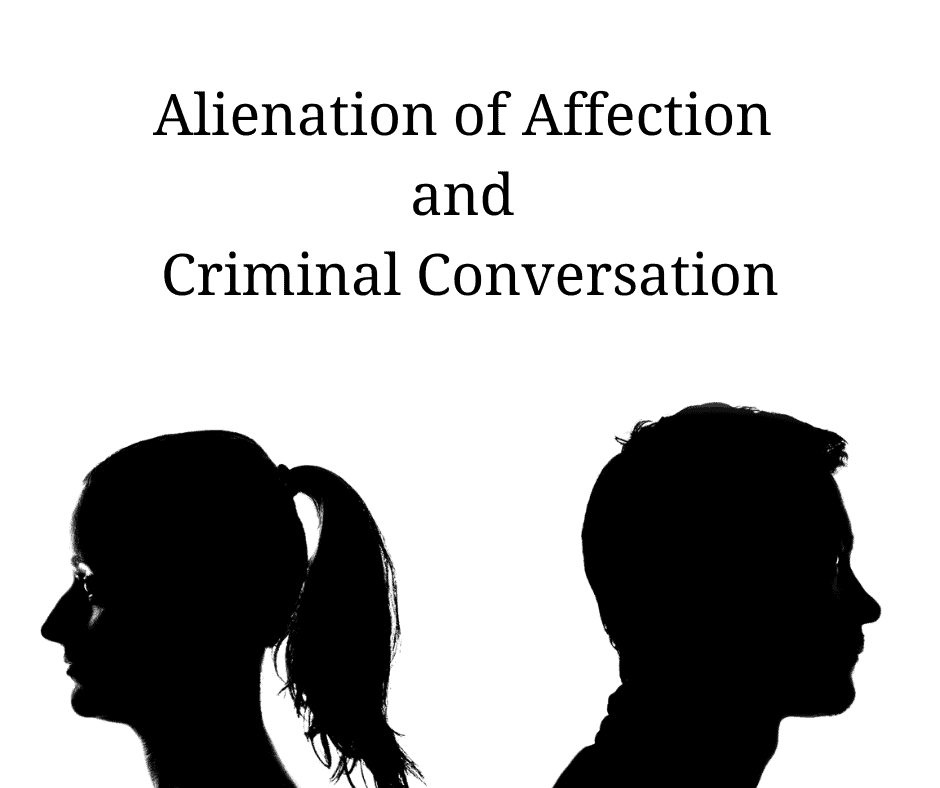If a spouse cheats, make sure you have evidence and to contact a lawyer. Find…
Every so often, a client comes into our office in emotional distress, devastated by the discovery that their spouse is having an affair. They feel so betrayed and hurt. It's a pain like no other pain, and they need to channel their anger and hurt. This can be done in several ways, some more constructive than others. In each case, however, at least part of this consultation will be dedicated to what you can legally do about this violation. One of the paths you may consider is an alienation of affection claim while another is a criminal conversation claim. In practice, these charges are often filed together.

Understanding an Alienation of Affection Lawsuit
The act of divorcing a spouse is a difficult decision and is considered to be one of the top stressors in life. No matter the reason for the split, marital relationships are complicated and there are many reasons for dissolving a marriage. When a spouse has engaged in an affair that seems to have diverted their affections, there is anger and hurt. Many times, the marital relationship has been irreparably severed.
The spouse who has been cheated on feels an affection lawsuit is the way they can have full closure. We've seen our clients labor under the idea that they can charge or file suit against their spouse for adultery, or alienation of affection. In truth, Alienation of Affection and Criminal Conversation are civil claims against the third-party paramour, not the spouse. The alienation of affection law is sometimes misunderstood. In other words, in an affection claim, you would be suing the other person for punitive damages.
These claims do not require a sexual relationship to take place to be valid. The adulterous spouse's lover (aka the third party) may have destroyed the marriage through his/her sexual conduct, malicious acts, and developing a relationship with the cheating spouse. All of which will cost you financially and emotionally. With an affection lawsuit, an experienced family law attorney can guide you in the proof you need when suing for punitive damages in affection cases.
What Is Alienation of Affection?
Alienation of affection is a tort, which means it is a wrong that is governed by civil laws. If you are in a marital relationship and someone interferes with your marriage, causing your spouse to lose affection for you, then you could potentially sue that third-party individual who interfered and ruined your relationship. A person who has knowingly shown wrongful conduct and committed wrongful acts that have destroyed a marriage can be sued in an affection case. Alienation of affection claims are typically filed after a divorce, but can technically be brought in any situation where a third party causes a marital relationship to go wrong.
An affection claim is usually brought against a person who has an affair with a spouse instead of suing the cheating spouse. The cheating spouse is not a party in this type of action; instead, it is a “battle” between the spouse who has been wronged versus the cheating spouse’s “paramour” (so to speak).
Alienation of affection laws are sometimes referred to as "homewrecker" laws. When a marital relationship is harmed seemingly by a spouse's affair that includes sexual relations with another person and the spouse's affections are focused on the third party, the non-cheating spouse can initiate an alienation of affection claim with the North Carolina court.
Alienation of Affection in North Carolina
Only a few states still allow alienation of affection lawsuits. Despite repeated efforts to do so, North Carolina is one of only six states in the United States that still has alienation of affection laws and has not abolished the use of these claims. While they are not appropriate in every case, some behavior screams out for legal redress and these torts are our only remedy against the third party.
If you or a friend or loved one has been affected by a cheating spouse (wife or husband), remember that these claims are separate and apart from any divorce-related action. They are against the intervening party, i.e., boyfriend or girlfriend. Also, remember that Alienation of Affection represents the actual destruction of the marriage, while Criminal Conversation represents a claim for the act of having sex with the spouse of another. The only direct legal effect the cheating will have on your spouse will be through marital claims such as alimony, where adultery plays a significant role. It can also be used as a justification to ask a Judge to remove your spouse from the marital home in an action for Divorce from Bed and Board.

How Important is Evidence of Spousal Cheating to Prove Alienation?
The specifics of what is required to prove alienation of affection claims can vary. In general, there are certain elements of the tort that a plaintiff must prove to prevail in court and receive punitive damages. Obtaining and preserving evidence is crucial in these cases, so please be cautious and smart about how you proceed. The services of a Private Investigator in consultation with your family law attorney can prove to be the best investment you could ever make. The spouse cheated on (the plaintiff in the lawsuit) will need to prove alienation by showing these four things:
- The person and their spouse were married and a genuine love and affection existed between them. The plaintiff doesn't need to prove the marriage was perfect. However, they must show there was a loving bond between the spouses before the adulterous spouse's lover interfered.
- The love and affection in the marriage was destroyed. The plaintiff must provide proof of divorce showing that the marriage became devoid of love and affection that previously existed.
- The wrongful and malicious acts of the third party alienated the affection of the plaintiff's spouse. This means that the defendant directly caused the affection between the spouses to be destroyed and resulted in them becoming alienated. The key to this is showing that the defendant's conduct must have actively tried to undermine or interfere with the marital relationship and caused the alienation of affection.
- The defendant's conduct was obvious and would lead a reasonable person to believe that it would lead to an alienation of affection and end the marriage. Additionally, it must be shown that the married couple had a physical separation that remained permanent in that the marriage was dissolved and is no longer.
Alienation of Affection Claim Statute of Limitations
Individuals considering legal action based on alienation of affection in North Carolina should be aware of the three-year statute of limitations. This legal timeframe begins from the date of the last wrongful act, marking the window within which a plaintiff must file a lawsuit. Failing to initiate legal proceedings within this three-year period may result in the forfeiture of the right to pursue the claim. Swift consultation with a family law attorney is crucial for those navigating the aftermath of a broken marriage and contemplating an alienation of affection lawsuit. An attorney can provide timely guidance on the specific details of the statute of limitations, assess the merits of the case, and take necessary steps to ensure the legal process is initiated within the required timeframe. Time is of the essence in alienation of affection claims, making prompt legal advice essential for individuals in North Carolina seeking to navigate this legal terrain.
How To Prove Criminal Conversation in North Carolina
In contrast to an alienation of affection claim, a criminal conversation claim holds distinct characteristics. One notable difference lies in the absence of a malice requirement for the claim itself. Unlike alienation of affection, which often necessitates demonstrating wrongful conduct with malicious intent, a criminal conversation claim can be sustained with any evidence of malice on the part of the defendant, making it a potentially more straightforward legal avenue.
Moreover, the sexual misconduct essential to establishing a criminal conversation claim carries its own weight in terms of potential punitive damages. If a plaintiff presents sufficient evidence of criminal conversation to the jury, the jury may also deliberate on the imposition of punitive damages. This underscores the importance of comprehensive legal counsel and the strategic presentation of evidence in such cases.
For individuals navigating the aftermath of marital betrayal, understanding these nuances and consulting with an experienced family law attorney is crucial in pursuing the most effective legal remedies.
Contact Our Raleigh Family Law Attorney for Support with Your Divorce Case
The Raleigh legal team of Doyle Divorce Law is ready to help you through the difficult process of a North Carolina divorce. Our experienced family law attorneys are knowledgeable and can represent your interest in alienation of affection cases. We will fight for you to get the punitive damages you are looking for. Complete the contact form below to schedule a time to speak with one of our family lawyers or call us at (919) 230-2094.



